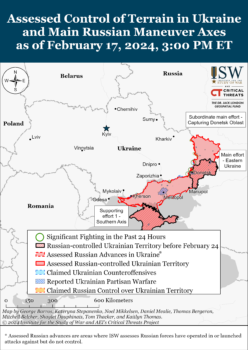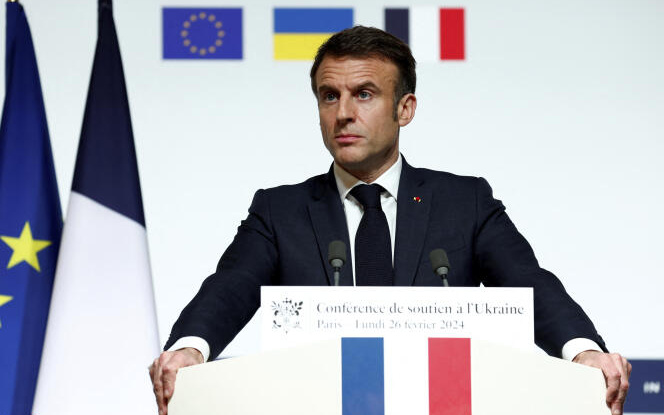French President Emmanuel Macron speaks during a press conference at the Elysee Palace in Paris, February 26, 2024 (Gonzalo Fuentes/AP)
Monday’s Coverage: Zelenskiy — 31,000 Ukrainian Troops Killed in Russia’s Invasion

Map: Institute for the Study of War
UDPATE 1544 GMT:
Ukrainian forces have pulled out of three small villages near Avdiivka, which was seized by Russia on February 17, in eastern Ukraine.
A military spokesperson said the forces left Lastochkyne, Stepove, and Severne, northwest of Avdiivka, to take up new defensive positions.
Each of the villages had about 100 residents before the Russian invasion.
UPDATE 1517 GMT:
Ukraine air defenses have shot down two Russian Su-34 fighter jets in the east of the country.
The Su-34s are the ninth and 10th Russian warplanes downed in the past two weeks, including one of Russia’s handful of A-50 early warning and command systems.
Ukrainian Air Force commander Mykola Oleshchuk, who announced the first downing earlier on Tuesday, posted:
At around 14:00, we engaged another Su-34. The area is the same! The target is the same type! With such losses of combat and specialized aircraft, the Russians should consider, at least for a while, suspending their “airborne meat grinder assaults”.
UPDATE 1509 GMT:
The office of Italian Prime Minister Giorgia Meloni, has said in a statement:
Since the Russian aggression two years ago, there has been full unity among all allies in the support for Kyiv. This support does not include the presence of troops from European or Nato states on Ukrainian territory.
A spokesperson for the Spanish Government, Pilar Alegria, said that Spain would prefer to focus instead on the need to “speed up the delivery of material” to Ukraine.
UPDATE 1437 GMT:
Two police officers have been killed and four injured by Russian shelling of the Sumy region in northern Ukraine.
Interior minister Ihor Klymenko wrote that the Russians deliberately fired on an investigative team as it documented damage from a Russian airstrike.
UPDATE 1426 GMT:
Germany, Hungary, the UK, and Sweden are the latest countries to say that they will not send troops into Ukraine (see 1051 GMT).
German Chancellor Olaf Scholz said:
What was agreed from the outset among ourselves and with each other also applies to the future, namely that there will be no ground troops, no soldiers on Ukrainian soil sent there by European countries or NATO states.
Hungarian Foreign Minister Peter Szijjarto said, “Hungary’s stance is clear and rock-solid: we are not willing to send either weapons or troops to Ukraine.”
A spokesperson for UK Prime Minister Rishi Sunak,“Beyond the small number of personnel we do have in country supporting the armed forces of Ukraine, we haven’t got any plans for large-scale deployment.”
NATO Secretary General Jens Stoltenberg assured:
NATO allies are providing unprecedented support to Ukraine. We have done that since 2014 and stepped up after the full-scale invasion. But there are no plans for NATO combat troops on the ground in Ukraine.
UPDATE 1407 GMT:
Air defenses have shot down a Russian Su-34 fighter jet near the frontline in eastern Ukraine, says Ukrainian Air Force commander Mykola Oleshchuk.
The Su-34 is the ninth Russian warplane downed in the past two weeks, including one of Russia’s handful of A-50 early warning and command systems.
UPDATE 1051 GMT:
Czech Prime Minister Petr Fiala and Polish counterpart Donald Tusk have refrained from support of sending troops to Ukraine.
At a joint press conference in Prague, Fiala said:
I am convinced that we should develop the paths of support that we embarked on after Russia’s aggression.
I believe we do not need to open some other methods or ways.
Tusk commented, “Poland does not plan to send its troops to the territory of Ukraine. I think that we should not speculate today whether there will be circumstances that could change this position.”
UPDATE 1038 GMT:
French Prime Minister Gabriel Attal has reinforced the message of President Emmanuel Macron that troops may have to be sent to bolster Ukraine’s resistance of the Russian invasion.
Attal told the RTL broadcaster “You can’t rule anything out in a war”. He said there is “no consensus” on any “official” deployment of ground troops, “but no dynamic can be ruled out. We will do whatever it takes to ensure that Russia cannot win this war.”
UPDATE 1029 GMT:
A Moscow court has sentenced human rights activist Oleg Orlov to 2 1/2 years in prison for “discrediting the Russian military”.
Orlov, 70, is one of the leaders of Memorial, established after the fall of the Soviet Union to document political repression and human rights abuses. The organization, which won the Nobel Peace Prize in 2022, was banned by Russian authorities the previous year.
The prosecution of Orlov began in 2023 after he translated a French article, “They Wanted Fascism. They Got It” on his Facebook page. The analysis sharply criticized the Russian invasion of Ukraine and accused Vladimir Putin of leading Russia towards fascism.
Orlov was initially fined 150,000 roubles ($1,633.50) in October for “discrediting the military”. The prosecution appealed the verdict and demanded a prison sentence.
Orlov said the pursuit of a prison sentence was a “demand from the top”: “I do not plead guilty, and the accusation is not clear to me.”
The activist refused to participate in the court proceedings, demonstratively reading Franz Kafka’s novel “The Trial”.
UPDATE 1021 GMT:
North Korea has shipped about 6,700 containers, with millions of munitions, since July for Russia’s invasion of Ukraine, says the South Korean Goverment
Defense Minister Shin Won-sik said the containers may have more than 3 million 152mm artillery shells or 500,000 122mm rounds: “It could possibly be a mix of the two, and you can say that at least several million shells have been sent.”
Shin said that while hundreds of North Korean munitions factories run at about 30% of capacity because of a lack of raw materials and electricity; however, those producing artillery shells for Russia operate “at full swing”.
On Friday, the US State Department said North Korea has delivered more than 10,000 containers of munitions or related materials to Russia since September. In exchange, North Korea has received 9,000 containers, mostly containing food supplies.
UPDATE 0845 GMT:
Ukraine President Volodymyr Zelenskiy says Kyiv has received less than a third of the 1 million artillery shells which the European Union planned to deliver by March.
EU officials, including foreign policy head Josep Borrell, have said the 27-nation bloc will meet 52% of the target and will reach 1 million shells later in 2024.
Zelenskiy said at a press conference with Bulgarian Prime Minister Nikolay Denkov in Kyiv, “Out of the million shells that the European Union promised us, not 50% came, but 30%, unfortunately.”
UPDATE 0834 GMT:
The US Army is using its own funds to support the training of Ukrainian troops, as Trumpists and hard-right Republicans block $60.1 billion in essential aid to Kyiv.
American military officials say that if there is no end to the blockade, the US Army in Europe and Africa may run out by summer of resources “for everything”, including the support for Ukraine and training and operations with NATO partners.
“It is an essential mission. We can’t turn our backs on them,” Pentagon spokesperson Sabrina Singh said. “Our Army, our services are gonna have to start talking and making decisions that can impact the entire force.”
UPDATE 0823 GMT:
Ukraine’s Air Force says air defense downed 11 of 13 Iran-made “kamikaze” drones and two of four Kh-59 missiles fired by Russia overnight.
The Russians also launched Iskander-M/KN-23 ballistic missiles and a Kh-31P guided air missile.
No casualties or damage have been reported yet.
ORIGINAL ENTRY: Displaying their support for Ukraine amid a Russian ground offensive and uncertainty over the US position, Europe’s leaders convened on Monday in Paris.
The 20 leaders pointed to the surge in military, economic, and financial aid and in security pacts, both through the European Union and through bilateral arrangements.
However, there was no consensus on French President Emmanuel Macron’s suggestion that ground troops could be sent to Ukraine, and German Chancellor Olaf Scholz pointedly refused Kyiv’s request for long-range Taurus cruise missiles.
Macron said that despite the lack of agreement, “nothing should be excluded. We will do everything that we can to make sure that Russia does not prevail”.
The President noted that previous objections to the delivery of armored vehicles, missiles, and warplanes had been overcome: “People used to say give them just sleeping bags and helmets….[Now] we must do whatever we can to obtain our objective.”
The meeting was convened by Macron to consider cyber-defense; joint production of military weapons and ammunition inside Ukraine; increased protection for Ukraine on its northern border with Belarus; demining of Ukraine; and defense of other countries threatened by Russian invasions such as Moldova.
Macron summarized, “There is a change in Russia’s stance. It is striving to take on further territory and it has its eyes not just on Ukraine but on many other countries as well, so Russia is presenting a greater danger.”
Setback Over Germany’s Missiles
The French President announced a new coalition to provide capability in long- and medium-range strike missile capability. This follows the provision of long-range SCALP missiles by France, and Storm Shadows by UK. Both have been used to devastating effect on Russian positions far behind frontlines, such as bridges, oil refineries, and warships.
But German Chancellor Olaf Scholz dampened the announcement with his rejection of rejected Ukraine’s appeal for the Taurus cruise missiles.
He told a conference held by the German news agency DPA, “It is a very far-reaching weapon. And what the British and French are doing in terms of target control and accompanying target control cannot be done in Germany.”
Ukrainian officials want the Taurus missiles, which can hit targets up to 500 km (312 miles) with great precision, to cut supply lines to Russia’s invaders.
Ukraine Foreign Minister Dmytro Kuleba told the German media network RND, “The final decision rests with Germany. But I’d like everyone to be aware that we do need these weapons.”
He said of concerns that the provision could bring Germany into direct conflict with Russia, “I think that after the first delivery of Leopard tanks, this fear was dispelled. Since then, the argument about escalation has been removed.”
In Paris, Macron assured that Russia “cannot win this war as “the sole aggressor” and “the sole country that instigated this war”: “Russia is now clearly affecting our own safety and security through both traditional and hybrid war.”
But he emphasized:
We cannot wait for the outcome of the American elections to decide what our future is going to be. It is the future of Europe that is at stake so therefore it is up to the Europeans to decide. If others want to join in and help, fantastic, but that is just an added bonus.

